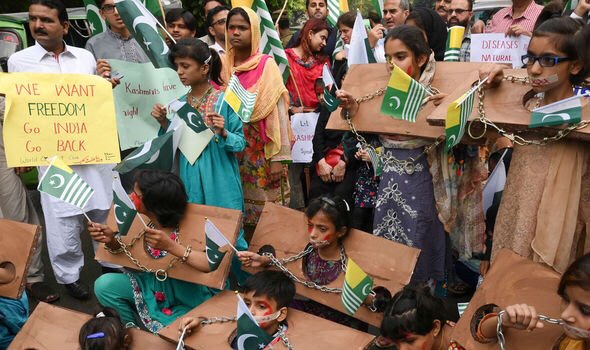
India-Pakistan fury: Fears of all out war over Kashmir as senator issues chilling warning
A PAKISTAN senator has condemned India’s activities in Kashmir following its controversial decision to revoke the region’s autonomy.
By Joel Day 05:44, Thu, Nov 28, 2019 | UPDATED: 05:44, Thu, Nov 28, 2019
Kashmir: Civilians mourn losses after cross-border attacks
Former Pakistan Ambassador to the US and leader of the opposition, Sherry Rehman, has condemned India’s move to revoke Kashmir’s special status in August. Ms Rehman also drew attention the the deteriorating relations between the US and Pakistan, and how Pakistan must do more in Kashmir to make its people heard.
In a conference that was attended by ambassadors from Turkey and Iran, she said: “Pakistan has a lot more to do for amplifying Kashmiri voices.
“We’re seeing an outpouring of support here today in Ankara.”
For the past few months, Kashmir has been subject of intense media attention when India decided to revoke Kashmir’s autonomous identity and centralise power to Delhi.
Violence in Kashmir can be traced back to when India and Pakistan won independence from Britain in 1947.

Sherry Rehman is the former Pakistan ambassador to the US (Image: GETTY)
A bloody partition occurred between the two states, with Kashmir opting to stay independent.
Kashmir’s Hindu ruler not long after ceded the territory to India, which has since seen a tense conflict brew as both states claim sovereignty over the region.
Both Pakistan and India are nuclear-armed, leading global powers to fear things could get out of hand.
Imran Khan, the former captain of the Pakistan national cricket team, in August vowed to throw his full force behind the fight to end Indian violations in Kashmir.

Imran Khan, Pakistan’s leader, has said his country won’t back down (Image: GETTY)
At the time, he said Pakistan’s army was preparing to respond to anticipated Indian aggression.
During a visit to Muzaffarabad, the capital of Pakistan-administered Kashmir, in a speech marking Pakistan’s independence day hr said: “The Pakistani army has solid information that they are planning to do something in Pakistani Kashmir, and they are ready and will give a solid response.
“We have decided that if India commits any type of violation we will fight until the end.
“The time has arrived to teach you a lesson.”

Many have protested what has unfolded in Kashmir (Image: GETTY)

The conflict ensued relatively quickly in August (Image: GETTY)
The speech was just one example of the battle of rhetoric that spanned several months, but has since simmered down – though, the potential for full blown conflict is still a threat, with neither side seeming to back down.
Various skirmishes broke out, with Pakistan’s Major General Asif Ghafoor writing on Twitter: “In efforts to divert attention from precarious situation in IOJ&K, Indian Army increases firing along LOC.
“Three Pakistani soldiers embraced shahadat. Pakistan Army responded effectively.
“Five Indian soldiers killed, many injured, bunkers damaged. Intermittent exchange of fire continues.”
Talking to Al Jazeera, Mr Ghafoor claimed that three civilians had also been caught up and killed in the border war on the Pakistani side.
Several high-profile political figures and notable names were imprisoned when tensions peaked.
Omar Abdullah, the descendant of a prominent political Kashmiri family and a former chief minister of the state was arrested.
The UN has since called for the withdrawal of forces and a plebiscite to determine the fate of Kashmir.

Rehman said Pakistan had a lot more to do to make the voices of Kashmiri’s heard (Image: GETTY)
UN resolutions have long been advocated by Pakistan, as well as holding a referendum on the regions right to autonomy.
India, however, has rejected any effort to “internationalise” the dispute, insisting that the disagreement be resolved bilaterally.
This, the nation claims, is the only way to resolve the issue, with it being directly in line with the 1972 Simla Agreement and 1999 Lahore Declaration.
No comments:
Post a Comment